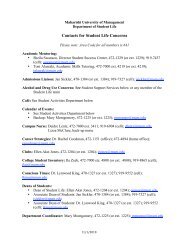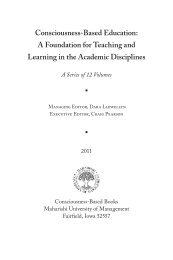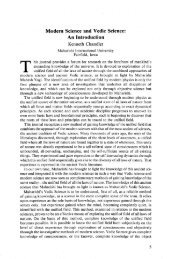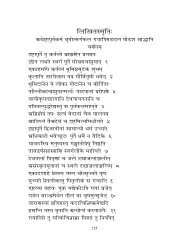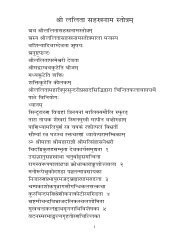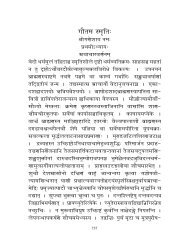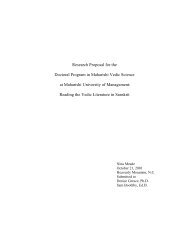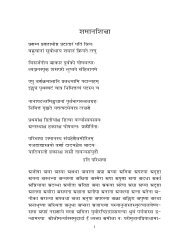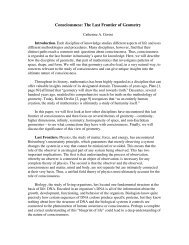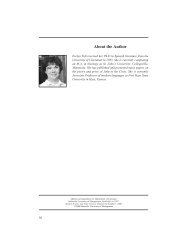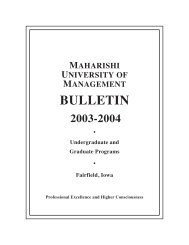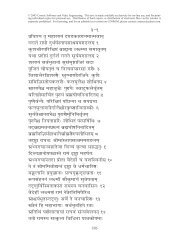The Bhagavad-Gita: A Case Study in Vedic Psychology - Maharishi ...
The Bhagavad-Gita: A Case Study in Vedic Psychology - Maharishi ...
The Bhagavad-Gita: A Case Study in Vedic Psychology - Maharishi ...
You also want an ePaper? Increase the reach of your titles
YUMPU automatically turns print PDFs into web optimized ePapers that Google loves.
MODERN SCIENCE AND VEDIC SCIENCE<br />
mental dynamics of natural law that have an eternal, universal character <strong>in</strong>dependent of<br />
particular time and place; at the same time, these dynamics are expressed <strong>in</strong> the context<br />
of events that occurred approximately five thousand years ago (<strong>Maharishi</strong> Mahesh<br />
Yogi, 1967, p. 9).<br />
At this time, Dhritarashtr, the bl<strong>in</strong>d k<strong>in</strong>g of the Kuru family, had delegated to his<br />
younger brother Pandu the management of his k<strong>in</strong>gdom. On Pandu's death,<br />
Dhritarashtr had decided to give his throne to Yudhishthir, the eldest of the five sons of<br />
Pandu, who was renowned for his righteousness, rather than to his own eldest son,<br />
Duryodhan, who lacked qualities of an ideal leader. Duryodhan seized the throne for<br />
himself and sought to destroy the five sons of Pandu, one of whom was Arjun. Lord<br />
Krishn attempts to resolve the conflict peacefully; however, his attempts fail, and war<br />
seems <strong>in</strong>evitable as Duryodhana's forces prepare for battle and the sons of Pandu prepare<br />
to defend themselves.<br />
In the context of <strong>Maharishi</strong><br />
are the expression of the whole<br />
<strong>Vedic</strong> <strong>Psychology</strong>, the actions of a governmental leader<br />
collective consciousness of the society (<strong>Maharishi</strong><br />
Mahesh Yogi, 1976, p. 122). (Please refer to Orme-Johnson and Dillbeck, 1987 for a<br />
detailed description of <strong>Maharishi</strong>'s pr<strong>in</strong>ciples of collective consciousness.) For example,<br />
when stress <strong>in</strong> the collective consciousness of a nation builds up to an extreme<br />
degree, it bursts out <strong>in</strong> turbulence or violence of some k<strong>in</strong>d, whether domestic or <strong>in</strong>ternational,<br />
and the decisions and actions of the head of state respond to and express this<br />
stress <strong>in</strong> national consciousness. <strong>Maharishi</strong> (1985a) comments on this situation <strong>in</strong> the<br />
context of the <strong>Bhagavad</strong>-<strong>Gita</strong> <strong>in</strong> the follow<strong>in</strong>g way:<br />
Duryodhan was the opponent of Arjun <strong>in</strong> the Mahabharat. When he was faced with some<br />
wise man, he said:<br />
Janami dharmam na cha me pravrittih<br />
I know what is right, but I cannot do it.<br />
Janamy adharmam na cha me nivrittih<br />
I know what is wrong, but I cannot refra<strong>in</strong> from it.<br />
Kenapi daivena hridisthitena<br />
Some motivat<strong>in</strong>g power decides <strong>in</strong> my heart<br />
yatha niyukto'smi tatha karomi<br />
and whatever it designs, that only I can do.<br />
Duryodhan was the head of state. He knew what was right but he could not do it; he knew<br />
what was wrong but he could not refra<strong>in</strong> from do<strong>in</strong>g it; and he gave the reason. He<br />
expressed ... that it is the national consciousness which is the motivat<strong>in</strong>g power of the<br />
head of state. (pp. 182-183)<br />
Arjuna's dilemma is outl<strong>in</strong>ed <strong>in</strong> the first chapter of the <strong>Bhagavad</strong>-<strong>Gita</strong>, which narrates<br />
his situation as the armies are prepar<strong>in</strong>g for battle. Feel<strong>in</strong>g <strong>in</strong>dignant when faced<br />
on the battlefield with the forces of Duryodhan, Arjun asks Lord Krishn to draw his<br />
chariot between the two armies so that he might more closely observe the oppos<strong>in</strong>g<br />
army. After do<strong>in</strong>g so, Lord Krishn, know<strong>in</strong>g that Arjuna's anger will weaken him,<br />
<strong>in</strong>duces a sudden change <strong>in</strong> Arjuna's attitude <strong>in</strong> order to make him receptive to the<br />
104



